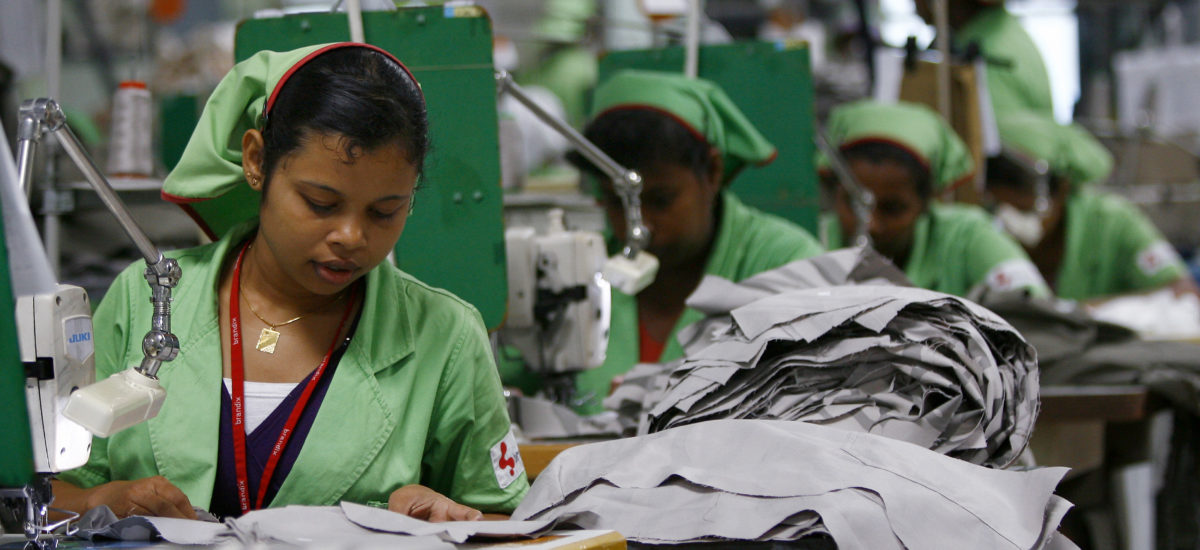Image courtesy Brookings Institution
Today is International Equal Pay Day
Gender equality is a fundamental human right, and as a result, it is crucial to ensure that every person has equal access to social, economic, political and cultural rights without any discrimination. In terms of economic rights, the gender wage gap is a well-established form of gender discrimination that cannot be economically and morally justified. As the result of continuous discrimination, on September 18, we commemorate International Equal Pay Day in support of long-standing efforts to achieve “equal pay for equal value of work.”
What is equal pay?
Women always have lower chances of getting into the workforce than men, and even if they get hired, they eventually face wage discrimination. Equal pay simply means that both women and men are paid equally for equally valuable labor. However, even in the present era, this appears to be limited to mere words and the pay gap can be observed in various ways in almost all societies in both the developed as well as developing countries, private sector or public sector and in formal or informal institutions.
The first and most broad way is organizational-level pay gap analysis which compares the average salaries that women and men earn across an organization at all levels. The Second way is by-level pay gap analysis, which has a significant impact on pay inequality because the highest-paid management and chief executive positions in corporate structures are mostly held by men, while women are disproportionately represented in backbench or support positions . Thirdly, there is a pay gap due to gender-based positions in a like-for-like analysis. For an example, in cases like salesman-shop assistant and flight attendant-stewardess, direct discrimination occurs when the same job is given different titles based on the jobholder’s gender.
Why is the salary disparity still prevalent?
There are many factors that contribute to the gender pay gap such as type and level of economic activity, sector, working time, age, marital status, tenure in position, number of subordinates, women’s behavioral factor and geography and also patriarchal society, discrimination, implicit bias, social gender norms, weaknesses of government labor regulations and economic reforms such as globalization inter alia. Existing patriarchal societies still purport the stereotypical notion that men are the sole breadwinners of the family and women are responsible for household chores, which is an evident indicator of why women are paid less. Occupational gender segregation also contributes to the widening of the wage gap. Gender norms and expectations are crucial factors in dividing men and women into industries and jobs. As a result, female-dominated occupations have emerged, which are typically underpaid and undervalued. Market constraints and skill requirements are frequently used to justify lower pay for women in female-dominated jobs. Despite the fact that laws and policies encourage non-discrimination, gender inequality still exists in job evaluation methods, hiring practices and promotion decisions, which prevent women from advancing to higher positions and, as a result, affecting remuneration. In informal economies, the gender pay gap is more prevalent. Informal jobs in the agriculture sector, domestic workers, and so forth, which have a higher female contribution, frequently fall outside the scope of labor laws. As a result, when there is pay discrimination, such workers have no recourse.
How does equal pay work?
Despite the fact that Sri Lanka boasts a regionally high gender equality in education and other socioeconomic metrics, the gender pay gap still exists and women participation in the labor force has remained at a low level of 30-36% for the past two decades. In line with recent statistics from the Global Gender Gap report in 2020, Sri Lanka has ranked 82nd among 153 countries for wage equality for similar work. Yet, with the current Coronavirus epidemic, the situation is exacerbated by the fact that women are at the first risk of losing their jobs due to the inability to balance responsibilities at home and work by the closure of many jobs in the informal sector. Women also therefore tend to engage in part-time employment that is often subjected to gender-bias discrimination on pay.
As enshrined in the Constitution, all people are equal before the law and entitled to equal protection under the law. Article 12 (2) of the Constitution secures that no person shall be discriminated against sex on the basis of, among other factors and guarantees to every person the freedom to engage in a lawful occupation. Furthermore, Article 12 (4) states that nothing in this Article shall prevent special provision being made, by law, subordinate legislation or executive action, for the advancement of women. In 1995 the government of SL implemented a National Workers’ Charter that ensures equality of opportunity and treatment to all women in relation to employment. Even though the Constitution ensures no discrimination under any circumstances, there is no specific provision in the labor laws requiring equal pay for equal work.
Sri Lanka, as a member state of the International Labor Organization, ratified the Equal Remuneration Convention (No. 100) in 1993 and vowed to ensure equal remuneration for men and women workers for work of equal value, which refers to rates of remuneration established without discrimination based on sex. Even with this international commitment, it is highly regrettable that even after three decades, there has been no sign of local enactment or discussion of an equal pay law.
Bridging the Gender Wage Gap
Ratifying to an international treaty itself is not enough to promote the objective of the particular convention. Member countries must take steps to put the convention into force, whether through specific legislation, national policy or other effective measures. For example, Article 48 of the Bolivian Constitution itself guarantees the right of women to receive the same remuneration as men for work of equal value in both the public and private sector. The USA has enacted the Equal Pay Act of 1963 and in Australia the equal remuneration provisions of the Workplace Relations Act 1996 were intended to give domestic effect to ensure the bridge the gender wage gap. Since it is crucial to enact legislation that specifically addresses equal pay, in Sri Lanka it would be vital to introduce specific legal provisions requiring equal pay for equal value of work. Moreover, equal remuneration for men and women can also be promoted by incorporating such objectives into national policies and action plans.
Even if laws exist, equal pay must eventually be accomplished in the workplace. In light of this fact, countries such as Finland, South Africa, Sweden have enacted proactive legislation that encourages or forces employers to analyze gender pay disparities and address violations. For instance in Finland, the Act on Equality between Women and Men of 1986 requires the employers who have more than 30 employees to draw up an equality plan which consists of an evaluation of jobs performed and wages received and measures to address remuneration disparities based on gender if any, in cooperation with workers’ representatives.
Collective agreements play a major role in diminishing the gender wage gap. Countries such as France, Uganda through their legal provisions facilitate such collective bargaining mechanisms to ensure equal remuneration for men and women. In France, the Labor Code mandates gender equality collective bargaining, which includes steps to eradicate pay disparities between men and women.
Promoting objective job evaluation is another strategy that can be implemented to close the gender wage gap. Gender-neutral job evaluation tools have been introduced in countries such as the Netherlands, Switzerland and New Zealand to help with equal pay. Thus, legislation should address and regularize the implementation of gender-neutral job evaluation methods.
The majority of women who are subjected to this unequal wage are informal economy workers who are not covered by law. Therefore, measures should be taken to formalize the informal economy bringing such workers under scope of law permitting them to have a platform to defend their interests.
Proper mechanism to ensure remedies for workers who believe their rights have been violated should be established. Their right to complain and receive compensation when there’s a pay discrimination should not be hindered. Progressive measure which is adopted by many countries in this aspect is the introduction of rules shifting the burden of proof to the employer.
Closing the gender wage gap will require the combined efforts of the government, public and private sector parties, and other key social organizations. Therefore, cooperation between government and employer organizations, trade unions should be enhanced. Government can encourage participation of employer organizations, trade unions when preparing reports on equal pay and support equal pay initiatives of the private and public sector through technical, financial or other means.
Raising awareness of the gender pay gap and its causes is necessary to demonstrate that such discrimination exists even today. It can be accomplished by conducting surveys and ensuring that such information reaches the general public and decision makers.
Definitions of equal pay focus primarily on the right of men and women to equal remuneration for work of equal value. In the modern world, other drivers of discrimination have emerged in workplace. Therefore, efforts to close the wage gap must address other forms of discrimination on pay particularly on LGBTQ community.
The gender wage gap directly impacts the development of a country socially as well as economically. How much of an impact can women create in the economic sector of a developing country like Sri Lanka, where the majority of the population itself comprises women? It goes without saying that women in the workplace must be provided with essential facilities devoid of any discrimination, and given due recognition, enabling them to contribute to rectify the economic recession that has accompanied the COVID-19 pandemic. This will help in achieving overall gender equality, make women financially independent, and make their families less vulnerable to the harsh realities of poverty, while positively affecting the standard of living of citizens. If the law of the country guarantees equal pay for equal value of work, we will not have to wait another 50 to 70 years to see the change of equal space for women in the workplace.


